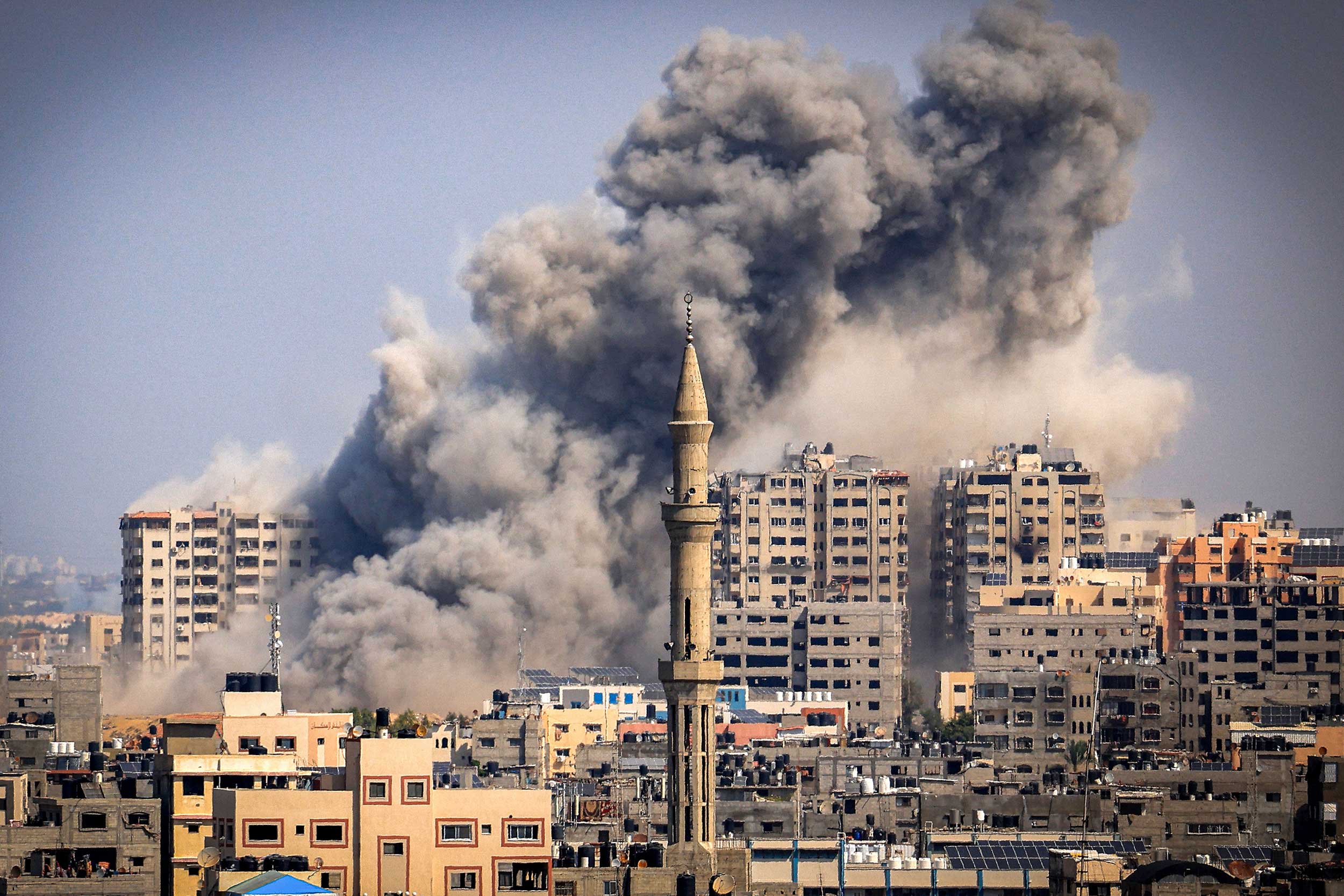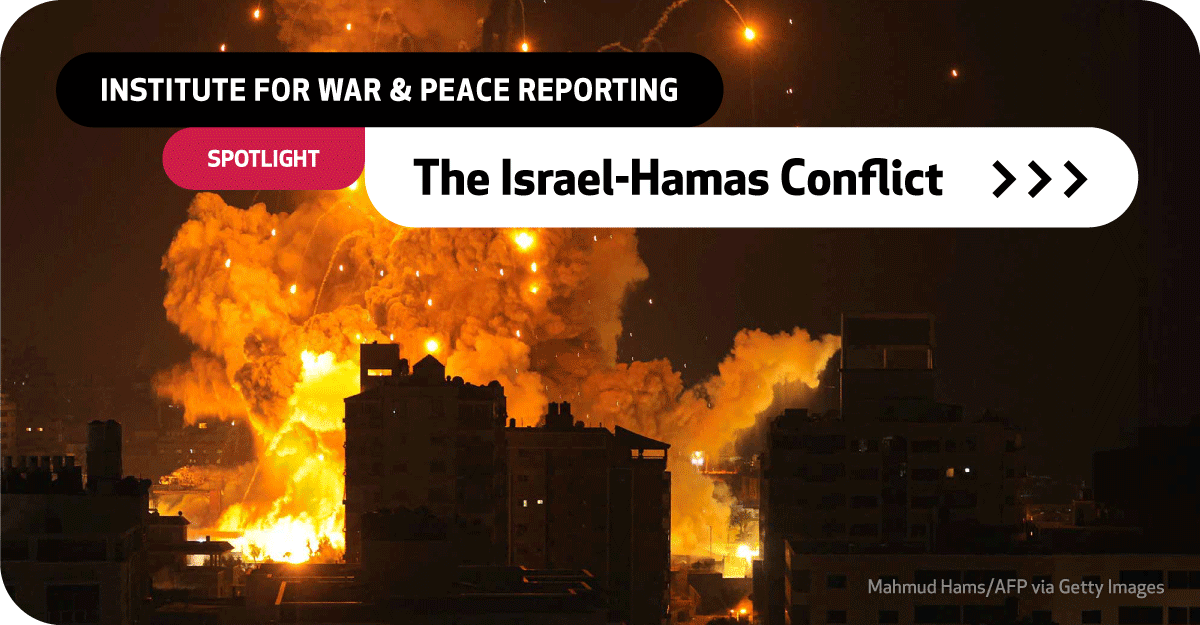Turkey Takes Sharp Stance Against Israel
Erdoğan appears to weigh appeasing domestic anger with the potential geopolitical benefits of restraint.
Huge crowds gathered in Istanbul last weekend to hear Turkish President Recep Tayyip Erdoğan address a vast rally organised by his AKP party, deemed “the Great Palestine Meeting”.
"Israel has been openly committing war crimes for 22 days, but Western leaders cannot even call on Israel for a ceasefire, let alone react to it," Erdogan told the crowds, many waving Turkish and Palestinian flags.
Others carried banners blaming the international community for their inaction over what was taking place in Gaza; “Palestinian kids die, the world watches,” one read.
“Erdoğan’s initial reaction to the Hamas raid on October 7 was markedly cautious.”
“I can't believe that children and their mothers die in Gaza, and we just sit and watch it in the year 2023,” Güler Açık, a mother-of-three from İstanbul, told IWPR. “We are here today because we are Muslims, and we can’t stay silent while a genocide happens.”
Her sentiment was one shared among many of those gathered at İstanbul’s former Atatürk Airport, with some also blaming other Muslim countries for not intervening.
“Our ummah [an Arabic word describing the Muslim community], is bigger than two billion,” Refik Ateş said, as he waited with his wife and son to hear the rally’s speeches. “If we were determined to save our brothers in Gaza, we could have done that. But except our Reis [an honorific supporters often use to describe Erdogan], no one took any meaningful steps. Shame on them.”
The issue of Israel-Palestine, always an emotive one in Turkey, has been pushed to centre stage as Erdoğan’s appears to weigh appeasing domestic anger over the war with the potential geopolitical benefits of a more measured stance.
The president’s initial reaction to the Hamas cross-border raid on October 7, in which nearly 1,400 people were killed and more than 200 taken hostage, was a markedly cautious one.
Urging all parties to avoid impulsive steps that would escalate tensions, he told an AKP party meeting that "we will continue to stand against any attempt and any occupation to erode the historical and religious status of the first qibla, Al-Aqsa Mosque," Erdoğan said.
He continued to pursue a tone of de-escalation, with the Turkish Foreign Ministry playing a part in diplomatic efforts in response to the growing conflict. Erdoğan even contacted his Israeli counterpart, Isaac Herzog.

But amid Israel’s ongoing military operation in Gaza - in which some 7,000 people have been killed - and continuing protests in Turkey, Erdoğan took a more hawkish stance.
"Hamas is not a terrorist organisation - it is a liberation group, 'mujahideen' waging a battle to protect its lands and people," Erdoğan told reporters on October 25, using an Arabic word denoting those who fight for their faith. He also announced that Turkey would end its recently-revived normalisation process with Israel.
Analysts believe that increasing domestic and international criticism of Israel had hardened the president's stance, especially since the Israel-Palestine conflict has a huge following among the voter base the AKP shares with other Islamist parties.
“Facing upcoming elections, Erdoğan had no choice but to adopt a harsher stance toward Israel."
İlkan Dalkuç, a political commentator from İstanbul, told IWPR that Erdoğan’s initially calm tone was because the fighting in Gaza came as Ankara was working to mend its ties with Israel, focusing on energy as an area of cooperation.
After more than a decade of tension, Erdogan met Israeli Prime Minister Binyamin Netanyahu in person for the first time at the end of September at a UN summit in New York.
"Potential energy cooperation in the Eastern Mediterranean and the positive effect of good ties with Israel on diplomatic relations with the US were some of the factors of Erdoğan's prudence and balanced statements," said Dalkuç. According to him, while sending Sweden's NATO bid to parliament in the same week, Erdoğan planned to get ahead of a possible Western backlash while conducting his political salvo.
Dalkuç argued that the increasing domestic anger against Israel also pushed Erdoğan to shift his position.
"Erdoğan didn't want to provide political gain to other Islamist parties by remaining unresponsive [to the situation]," he concluded.
A senior advisor from the Felicity Party, which entered parliament with the opposition after the last elections but is from the same political background as AKP, told IWPR that the president had been "a little bit too late to the field”.
"Erdoğan's recent comments are better than nothing, yet he is only trying to release the tension building in the streets, in front of consulate buildings," said the advisor, who asked to remain anonymous. "He also didn't want other actors close to the Palestinian cause to get any political gain from the ongoing protests."
In an analysis published in the pro-government Daily Sabah newspaper, journalist Dilara Aslan Özer pointed out that the country was preparing for local elections next spring, following a two-round presidential election last May.
"The Turkish republic's reaction to the conflict and that of several political parties has been sensitive as well as with anger, with protests in several cities and even calls for the Turkish Armed Forces (TSK) to enter Palestine," Özer wrote. "Facing local elections in March 2024, Erdoğan had no chance to ignore the calls and adopted a harsher stance toward Israel."
This had clearly paid off among many of those at the AKP’s Palestine rally on Saturday, who praised Erdoğan's example as one of true leadership.
“We are happy to join one with our president,” said one young woman. “We understand that he needed to keep the upper hand at the negotiation table earlier. But he couldn’t stand the genocide in Gaza. He is the only one who can solve this, and we’ll be walking under his leadership both inside the country and across all the Islamic world.”

